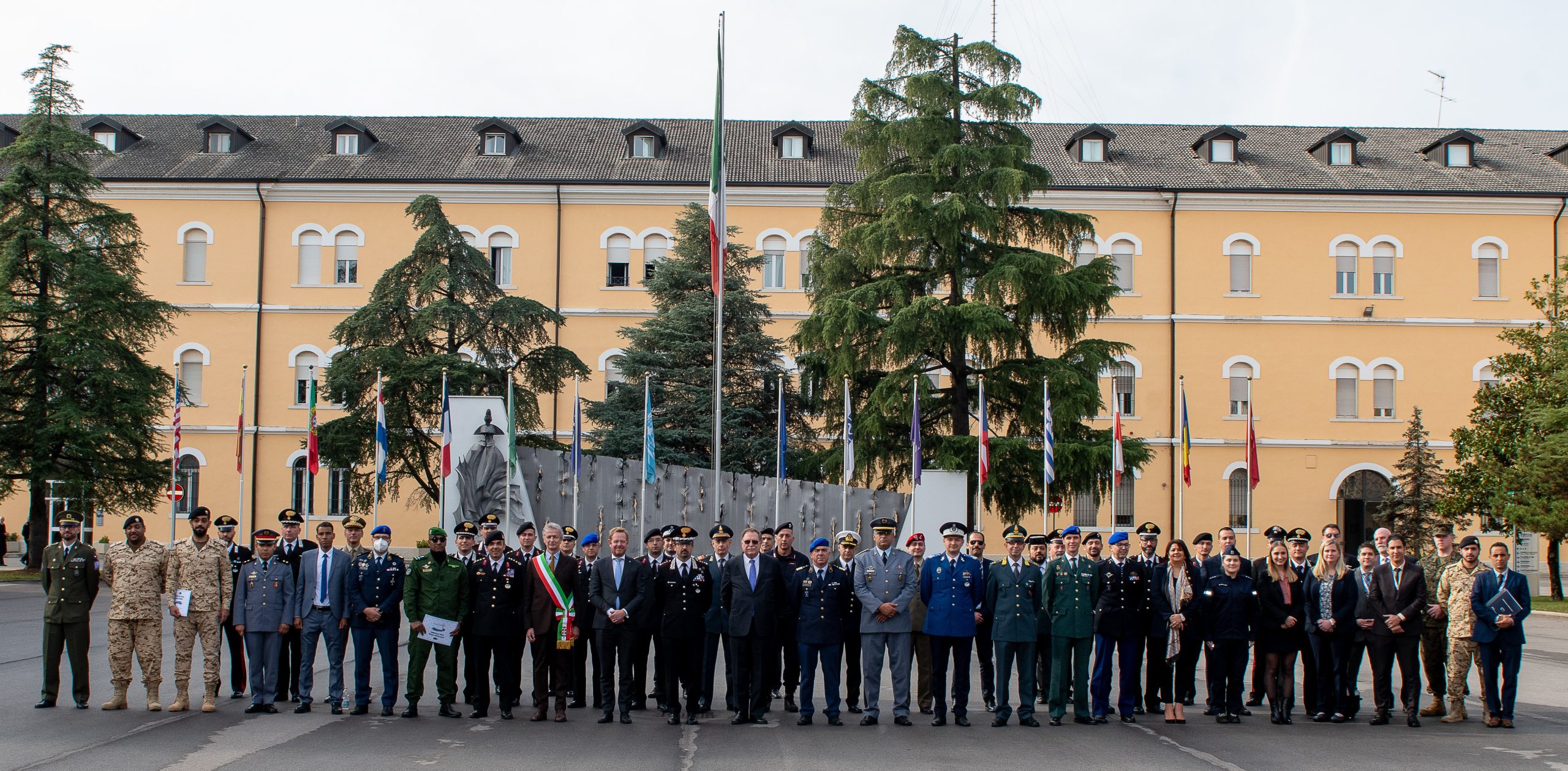Visit of the NATO Assistant Secretary General for Emerging Security Challenges and of the Head of the Bureau of Counterterrorism of the US State Department, as well as Special Envoy of the United States of America “for the Global Coalition to defeat ISIS”

On 11 November 2022, the NATO Assistant Secretary General for Emerging Security Challenges, Mr David VAN WEEL, first adviser to the NATO Secretary General, Jens STOLTENBERG, on the new challenges and threats facing the Atlantic Alliance, visited the NATO Stability Policing Centre of Excellence (NSPCoE).
The visit was also attended by Mr Timothy Alan BETTS, Head of the Bureau of Counterterrorism of the US State Department, as well as Special Envoy of the United States of America “for the Global Coalition to defeat ISIS”, one of the leading US experts in the global fight against Terrorism and the elusive Islamic State.
The presence of the two high International Authorities was linked to the fact that they intervened at the closing ceremony of the fourth edition of the “Battlefield Evidence Institutional Level” course.
The particular training activity arises from a request from the NATO International Staff (the advisory board of the Council of the Atlantic Alliance chaired by the Secretary General, who is responsible for immediately following up the political decisions adopted by the Member States) in the context of the ” Voluntary National Contribution Fund (VNCF) Battlefield Evidence (BE) Institutional Training Project ”and is fully funded by the United States of America through that Department of State.
The course aims to support NATO Partner Countries in the development of capacity to search for the elements of evidence and sources of evidence in particularly destabilized and high-risk scenarios, such as << battlefields >>, with a specific focus on terrorist attacks. terrorist matrix. This is to provide military unit commanders and tactical unit personnel with basic knowledge and skills on crime scene conservation, management and investigation, as well as evidence gathering.
In fact, the first sources of evidence of terrorist attacks and / or events arise from this particularly delicate and highly professional activity; its proper execution is vital to increase the likelihood of successfully prosecuting the perpetrators of such criminal acts.
The four editions of this highly specialized course saw the presence of 67 members of armed and police forces from 14 Nations belonging to the Mediterranean Dialogue Countries, the Istanbul Initiative Cooperation and the G-5 Sahel, i.e. Algeria, Bahrain, Burkina Faso, Chad, Egypt, Israel, Jordan, Kuwait, Mauritania, Morocco, Niger, Qatar, Tunisia and the United Arab Emirates. The instructors come from the Central Carabinieri Scientific Investigations Group and the Carabinieri Scientific Investigations Department of Parma, from the Polish Policja, from the Turkish Jandarma, and from the United States Southern European Task Force (SETAF) stationed in the Ederle Barracks in Vicenza, whose staff devoted themselves to education on the use of biometric devices, as well as on the tactical approach to be observed in a sensitive site under enemy control.
Furthermore, last Thursday, the visiting personalities also had the opportunity to witness first-hand the practical simulation activities on the ground planned for the students, carried out in an extremely realistic way to test the level of learning during the theoretical phase, as well as to concretely highlight both the risks that are incurred on the battlefield, both the most common (sometimes fatal) errors committed by “first responders”, and the best practices to be adopted to safeguard the sources of evidence, made even more complicated by the continuous exposure to danger and by the limited time available for the activities to be carried out, extremely limited.
During the ceremony, the President of the Municipal Council of Vicenza, Attorney Valerio Sorrentino, was also present, to testify the link of the City with the NATO Centre of Excellence and the Carabinieri, represented by Brigadier General Giovanni Pietro BARBANO, Director of the Center of Excellence for the Stability Policing Units (CoESPU), who spoke on behalf of the Deputy Commander General of the Carabinieri, Corps General Maurizio Detalmo MEZZAVILLA, bringing his official greeting, the following intervened, in order:
- Colonel of the Carabinieri Giuseppe DE MAGISTRIS, Director of the NSPCoE who, underlining the importance of the subject of the course, highlighted how the fight against terrorism – one of the main threats facing the Member States of the ‘Atlantic Alliance, most recently emphasised in NATO’s Strategic Concept adopted on the side-lines of the Madrid summit on 29 June last – fully falls within NATO’s Stability Policing mission, given that the replacement, reinforcement and training of the Police Forces in fragile states are its core business;
- Mr Timothy Alan BETTS, Head of the Bureau of Counterterrorism of the US State Department, as well as Special Envoy of the United States of America “for the Global Coalition to defeat ISIS”, underlined:
- US pride in supporting this type of training and partnership to invigorate the fight against terrorism and violent extremism, whether of a sectarian, political or racial nature, and to improve collaboration between military and civilian authorities;
- how no country can fight terrorism alone, but a joint effort is needed, which activities like the one carried out at the NSPCoE this week can only promote;
- NATO Assistant Secretary General for Emerging Security Challenges, Mr David VAN WEEL, paying particular attention to thank the operators for the quality of the training activities administered, announced that they will continue in the years to come (two more editions are planned for 2023), and that the collaboration with the NSPCoE will also concern the development of a further course concerning the protection of cultural heritage as a tool for preventing the financing of terrorism.